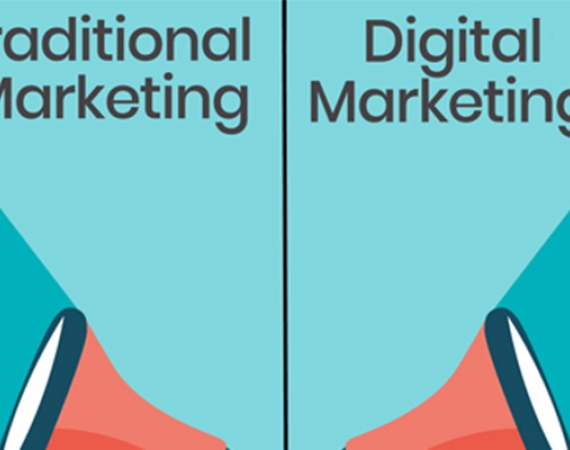As important as it is for any business to set aside a budget for marketing, it is equally important to spend that budget in the most cost-effective and ROI positive way. But, how do you know where to spend said budget when it comes to digital marketing vs traditional marketing?
For many businesses, it is difficult to decide on which path to head down, as this decision can have a huge impact on the results you achieve. We are going to help clear things up for you and give you a well-rounded view on both marketing methods, the differences between them, their pros and cons and which one we recommend you should choose.
The Introduction of Traditional Marketing
It is a well-known fact that traditional marketing has been around much longer than digital marketing.
The oldest form of traditional marketing is ‘Print marketing’. This is defined as advertising in paper form, a strategy that has been in use since ancient times when Egyptians created sales messages and wall posters on papyrus.
Fast forward to more modern times, print marketing usually refers to specific advertising space within newspapers, magazines, newsletters, etc.
Another popular form of traditional marketing is ‘broadcast’, more commonly known as television or radio advertising. Radio broadcasts have been around since the 1900s and television marketing was pretty quick in its adoption of adverts with only a year gap between its inception, to the first television commercial aired in 1941.
There is also telemarketing or ‘telephone sales’. In the modern world, this is quite a controversial form of traditional marketing as it is associated with scammers and aggressive forms of selling.
The Introduction Of Digital Marketing
The term Digital Marketing was first used in the 1990s and the rise of the digital age can really be traced back to the introduction of the internet. With the introduction of the internet, this now allowed people to easily find the information they wanted, and it wasn’t long before companies started to capitalize on all this newfound digital interest!
It was in 1993, when the first clickable banner went live after a company called HotWired purchased a few banner ads for their advertising. This marked the beginning of the transition from traditional to digital marketing, and because of this shift, 1994 was a year where many new technologies entered the digital marketplace. The very same year, Yahoo was launched.
Within its first year, Yahoo received over 1 million hits! This sparked a series of changes within the digital marketing world, with businesses optimizing their websites in order to achieve higher search engine rankings. It wasn’t until 1998 that Google first emerged on the scene. By 2004, we saw the introduction of Web 2.0, and there were many forms of search engines competing against each other for attention. In 2004, internet advertising and digital marketing had brought in $2.4 billion alone in the US!
Social networking was first introduced through Myspace, with Facebook soon to follow, and thus began the rat race to advertise and capture as much attention as possible!
Digital marketing can be deemed as still ‘fairly new’ to the world, with it only really being around for 20-30 years. However, in that short period of time, it has revolutionized the way brands and people advertise to consumers and promote their products and services. With a projected 230.5 million Americans by 2021 to be purchasing online, digital advertising seems to be paying off!
The Differences Between Digital & Traditional Marketing
What may not be that noticeable upon first thought, is that one of the main differences between digital and traditional marketing is the medium in which an audience of people comes across a marketing message.
What was once a television commercial 50 years ago, has been transformed into a Youtube advert in the present day. What was once an article within a newspaper, has been transformed into the modern-day blog post or online article.
Now, those traditional forms still exist today, but they have simply been packaged into more accessible, consumable, modern-day formats, through the introduction of digital marketing.
Another difference between the two is cost. Traditional marketing, more often than not, bears a higher cost and is less affordable than digital marketing. The reason being is because digital marketing offers an array of paid and free marketing methods. For example, posting content on social media is free to do so, and SEO may bear a higher start-up cost and not provide an instant return, but with effective SEO over a period of time, the potential for ROI will increase and continue to do so. An advert in a newspaper stays in that same newspaper unless you purchase another placement.
Analytics provided by Your Digital Resource state that the average cost to reach 1000 people with TV commercials is $7, whilst reaching the same amount of people with Facebook Ads comes to a measly $0.25. The diagram below shows a good visual of this.

In addition to the medium in which an audience is reached and the cost of advertising, traditional marketing is struggling to shift over to the younger generations, which ultimately shape the future of consumer behaviour. According to Statista, there were around 3.9 billion users on the internet in 2019. This number is only going to grow and with the heavy use of the internet, social media and applications, digital marketing is only going to further outperform traditional marketing.
Digital marketing seems to excel in the areas that traditional marketing simply cannot offer. There is no surefire way to know precisely what results you achieved out of your traditional marketing campaign. Yes, there have been advancements over the years helping track the viewers of TV commercials or eyeballs on a billboard, but nothing revolutionary. Whereas with digital marketing, pretty much every metric you can think of can be measured, reviewed and tested to produce the most effective ROI possible.
However, that does not mean that traditional marketing is useless. There are still instances where traditional marketing can be quite successful (in its own right), especially if you look at it on a local level.
A great example of this would be running a direct mail or billboard campaign for a local restaurant. They can tap into their local area and offer highly targeted traditional marketing methods to people in said area.
A car dealership could run a radio advertisement because a lot of people listen to the radio whilst they are driving, meaning they can hit a good range of potential customers that may wish to make an upgrade.
And what about job advertisements? A business looking to hire a new employee can publish an advertisement in the local newspaper with the details of the job, and reach people that are going to be interested in said job.
Another advantage of traditional marketing is that it can provide your audience with a ‘physical copy’. As good as digital marketing is, you just can’t hold it in your hands, and there is something quite comforting and raw about reading an advertisement in the newspaper or getting a nice leaflet through the door. This is something that the older generations still appreciate and if your businesses customers are of an older demographic, traditional marketing will help you reach them.
Arguably, traditional marketing is seen as more consistent and easier to implement than digital marketing. Traditional marketing methods are very fixed by nature, so you do not have to compete with market changes like you would with the introduction of new technology within digital marketing. Also, Traditional marketing tends to be simpler to learn and put into practice than digital marketing. There’s less of a learning curve, and many businesses already have some experience with traditional marketing channels.
With newspaper ads or magazine ads, you only need to create the ad, and then someone else handles the publishing for you. Unlike digital marketing, you don’t have to implement it with an advertising method like you need to with digital marketing. You can focus a lot more time and energy on the advertisement method rather than its implementation.
Pros & Cons Of Digital Marketing
In order to give you a well-rounded view of digital marketing, we have put together some more pros and cons below.
Pros
- Digital marketing can be a very low cost.
- It can access a massive audience of people, all around the world.
- It offers you an opportunity to expand your customer service.
Cons
- Digital marketing is going to consume a lot of your time.
- Your marketing can get lost in the online white noise that exists.
- Digital marketing judges you on first impressions.
Pros & Cons Of Traditional Marketing
Just like we have done for digital marketing above, we have listed some more pros and cons of traditional marketing below:
Pros
- Traditional marketing is harder to ignore, as it can be placed everywhere publicly, and you cannot ‘switch it off’ like you can with digital.
- Traditional marketing methods such as direct mail offer a specific kind personal touch that digital email marketing simply cannot offer.
- Some traditional marketing methods such as flyers, direct mail etc. can easily be done in house without the need for external marketing teams or additional hires.
Cons
- Traditional marketing, more often than not, is more expensive than digital marketing, especially when considering total costs of production and media buying.
- It is far less measurable than digital marketing, as it is hard to track whether or not someone saw your advertisement in a newspaper, was watching your TV commercial or looked up at your billboard for example.
- Traditional marketing doesn’t have the same ability to target and sub-segment as digital.
- This form of marketing is gradually losing its audience, especially as the younger generations mature and advance into more and more new and digital technologies.
Which One Should You Choose For Your Business?
So, we have discussed what traditional and digital marketing include, how they came about, their differences, and their pros and cons, but which should you choose? Well, that question poses an answer that is very specific to your business, objectives and budget.
Marketing is not a ‘one size fits all’ and never has been. The best marketing campaigns incorporate a mix of different marketing strategies to meet their ultimate marketing objective. However, this can often require a significant marketing budget and immense planning and preparation., and really does differ from business to business. The introduction of e-commerce and online businesses created a big shift in the way advertising is approached, meaning what works for a local business, may not be the best for an online business.
Digital marketing is often more favoured because of its lower cost, better tracking and measurement and broader abilities, however, traditional marketing is tried and tested, easier to implement and great for local business exposure.
To help you in this decision process, we have included some advice depending on what type of business and size of marketing budget you have.
Our Advice For Local Businesses With Low Marketing Budgets
If you are a local business working with a low marketing budget, then traditional marketing may not be the best option for you right now. Digital marketing will allow you to further stretch your budget and reach more people for a lower CPM (cost per thousand impressions) An example of a digital marketing campaign you could run, is a brand awareness campaign using Facebook Advertising. This will allow you to reach 1000s of people in your local area, and unlike a one-off newspaper ad or radio campaign, your advert can be continuously shown to people, as long as it is live. Plus, digital marketing incorporates many free/low-cost strategies, such as Social Media, SEO and Website Content (blog content).
For more information read Facebook Advertising
Our Advice For Local Businesses With Higher Marketing Budgets
In this case, we recommend that you still invest in digital marketing, but supplement those campaigns and test some traditional marketing strategies, such as newspaper or radio ads. Being a local business, you can still benefit from traditional advertising by tapping into the local attention, but the reason we recommend to also invest in digital marketing is because this is going to allow you to track KPIs (key performance indicators) that are crucial in knowing whether your campaigns are successful or not. The traditional marketing strategies can act as a supplement to help further increase your reach.
Our Advice For Ecommerce Businesses
For e-commerce businesses, as sales and fulfilment is completed over the internet, traditional marketing is most likely not the avenue to go down when it comes to your marketing. In order to reach a big enough audience with traditional marketing, and see a return on your investment, marketing will need to be done on a national level, not local. This will become extremely expensive, thus making digital marketing a much better option. Digital marketing fits eCommerce like a glove, and they hand in hand with each other, so we recommend to take full advantage of this, and focus your marketing efforts and budget solely on digital marketing.
Conclusion
We hope that has given you a well-rounded view on digital vs traditional marketing. Remember, each has its pros and cons and should be taken into consideration when deciding which route to head down.
Have you read our blog post on The Importance Of Content On SEO & Organic Traffic?
If you are interested in finding out how VEVS and our team of experts can help your business when it comes to marketing, please visit our digital marketing page for more information.











